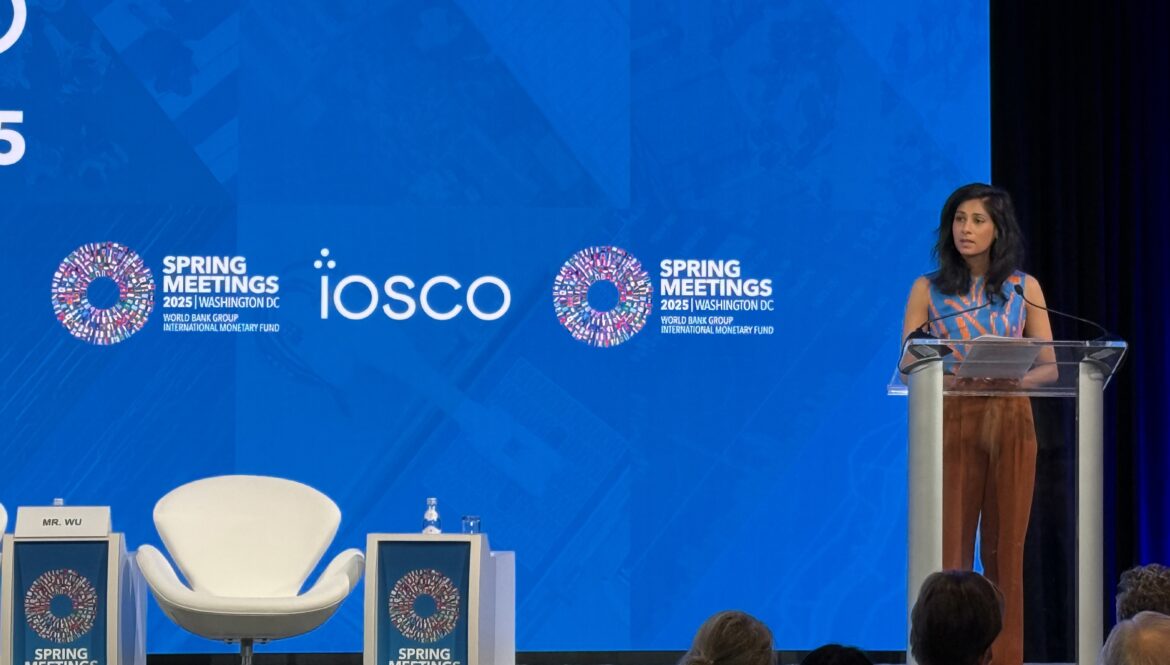Deputy Managing Director of the International Monetary Fund (IMF), Gita Gopinath, underscored the vital importance of resilient and stable capital markets in fostering economic growth by enabling the efficient allocation of resources. Robust markets, she noted, empower businesses to expand, help governments finance critical projects, and support individuals in achieving their financial goals.
Gopinath delivered the opening remarks at the second Annual IMF-International Organization of Securities Commissions (IOSCO) Conference on Market-Based Finance, during the 2005 IMF-World Bank Spring Meetings, held on April 21, 2025, at IMF Headquarters in Washington D.C.
She remarked, “Today’s conference offers conversations among senior policy makers and regulators, industry and academics, and they’re all going to focus on key topics in capital markets. I’m just going to list a couple.”
One major focus of the conference, according to Gopinath, is the growing use of Artificial Intelligence (AI) in capital markets – particularly generative AI – and the opportunities and risks it presents. She noted that while AI can enhance efficiency and improve supervisory processes, it also raises concerns such as increased market volatility, reduced accountability, and over-reliance on a small number of third-party vendors. In response, she emphasized the need for regulatory and supervisory frameworks to evolve in line with technological change.

Another key theme was the transformation of investment management, notably the rise of Exchange-Traded Funds (ETFs). Gopinath highlighted how ETFs have evolved from passive investment tools into active strategies offering diverse risk-return properties.
“ETFs may reduce investors liquidity risk, and therefore that provides a benefit among many others,” added Gopinath. “But at the same time, it is important to remain vigilant regarding potential vulnerabilities and to consider what measures need to be taken to support market stability.”
Gopinath also emphasized the significance of the IMF-IOSCO partnership in advancing global macroeconomic and financial stability through policy development, surveillance, and capacity building. She said the conference aimed to stimulate thoughtful discussion and further strengthen collaboration between the organizations.
The conference featured two panel discussions and a fireside chat. The opening panel, “Trends in Artificial Intelligence and Implications for Financial Stability,” was moderated by IOSCO Secretary-General Rodrigo Buenaventura and participated by global experts.
Assistant Managing Director at the Monetary Authority of Singapore (MAS), Tuang Lee Lim, referenced a 2021 report on AI in finance, which identified six critical challenges: oversight, monitoring and testing, internal expertise, third-party service management, disclosures, and data governance. Lim emphasized the need for regulatory frameworks to keep pace with rapid AI adoption, noting that AI is increasingly used for automation, anti-money laundering, and data analysis.
He also highlighted the transformational nature of generative AI and large language models like ChatGPT, which have reshaped human-AI interaction but also introduced risks, such as “hallucinations” and dependency on a few technology providers.
Vice-Minister for International Affairs, Financial Services Agency (FSA), Shigeru Ariizumi, noted that FSA’s recent report, found 70 percent of Japanese financial institutions now use AI, primarily for internal operational efficiency. However, he expressed caution about its use in client-facing services due to potential vulnerabilities. Ariizumi stressed the importance of ensuring transparency, fairness, and ethical AI use. He announced plans for a roundtable with regulators, stakeholders, and AI developers to better understand AI’s implications.
CEO, Financial Conduct Authority (FCA), UK and Co-Chair, IOSCO Financial Stability Engagement Group, Nikhil Rathi, called for greater investment in regulatory capabilities to harness AI effectively. He described the FCA’s use of AI for financial promotions and network analysis and advocated for AI integration across entire organizations. Rathi emphasized the value of international forums like the IMF and IOSCO in exchanging best practices and use cases.
Assistant Director, Monetary and Capital Markets Department, IMF, Jason Wu, discussed findings from the Global Financial Stability Report regarding AI’s impact on productivity and labor. Wu pointed to increased AI applications in data processing, risk management, and equity trading, supported by rising patent filings and job postings related to AI in finance.
Managing Director, Market Analytics and Regulatory Structure, Citadel Securities, Gregg Berman, offered insights into the longstanding use of AI in finance, especially in predictive modeling and risk assessment. He noted that generative AI is streamlining data processing and enhancing market efficiency. Berman stressed the importance of understanding AI’s practical applications to fully appreciate its influence on the financial sector.






